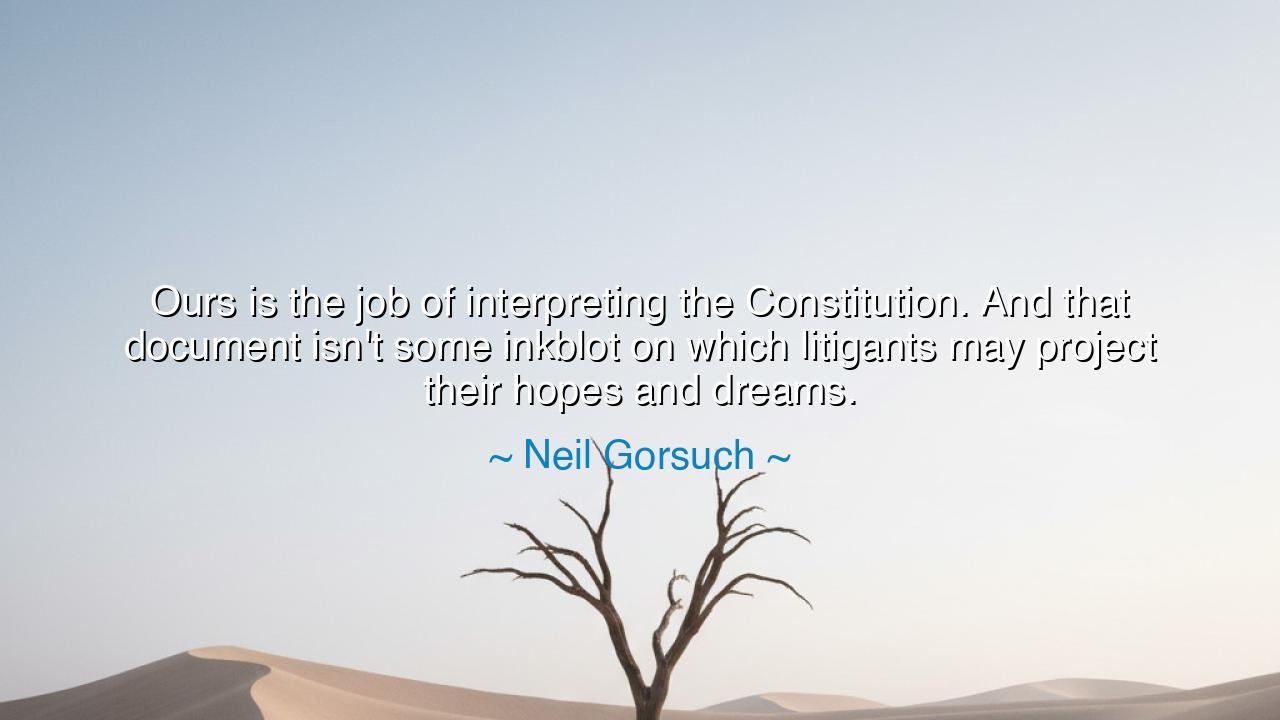
Ours is the job of interpreting the Constitution. And that
Ours is the job of interpreting the Constitution. And that document isn't some inkblot on which litigants may project their hopes and dreams.






When Neil Gorsuch declared, “Ours is the job of interpreting the Constitution. And that document isn't some inkblot on which litigants may project their hopes and dreams,” he spoke as one entrusted with the sacred duty of judgment — a guardian of law standing at the boundary between passion and principle. His words are both an affirmation and a warning: an affirmation that the Constitution is a living covenant, meant to endure through ages, and a warning that it must not be twisted into a mirror of personal desire. For Gorsuch reminds us that justice is not the servant of emotion, but the steward of order; not the invention of each generation’s whims, but the preservation of enduring truth.
This saying arises from the heart of America’s judicial philosophy — the ancient and ever-renewed debate between those who believe the Constitution should be interpreted according to its original meaning, and those who see it as an evolving instrument shaped by time. Gorsuch, a judge of the Supreme Court and heir to the tradition of originalism, stands in the lineage of thinkers like Antonin Scalia, who taught that the judge must read the law as it is written, not as one wishes it to be. The Constitution, Gorsuch insists, is not an “inkblot,” an amorphous stain onto which men and women may project their hopes and dreams, but a written testament — deliberate, reasoned, and bound by the wisdom of its framers.
To understand his meaning, one must look to the founding of the republic itself. The men who wrote the Constitution had seen tyranny and anarchy alike; they knew that passion, though noble, can easily destroy what it seeks to uplift. Thus, they set down the words of law as anchors in the sea of history — not to prevent change, but to ensure that change would come through reasoned deliberation, not the fever of the moment. When Gorsuch speaks of “interpreting,” he speaks of listening — of seeking the intent behind the words, rather than rewriting them in the image of modern desire.
The ancients would have recognized this as a call to balance. For even in the days of Solon and Cicero, the wise knew that law is not a creation of impulse, but of reflection. Solon, when asked whether his laws were perfect, answered, “They are the best the people would accept.” He understood that a nation must be ruled by principles that outlast its tempers. Gorsuch, too, speaks in that same spirit: that to preserve liberty, the judge must sometimes resist the yearning to please, to reform, or to dream — and instead must hold fast to the truths already written. For the law, once it becomes a vessel for emotion, ceases to be law at all.
Consider a moment in history when this truth was tested. In the 1930s, during the depths of the Great Depression, the Supreme Court was urged to bend the Constitution to the economic despair of the age — to allow government powers beyond what the text permitted. Many believed it necessary; many thought it merciful. Yet each step away from the written word brought the risk of unmooring the nation from its foundations. Later, in times of war and crisis, similar temptations arose — to sacrifice principle for expedience, freedom for fear. Gorsuch’s warning echoes through those moments: that the hopes and dreams of one era cannot be the compass for eternal law. For a nation without boundaries of principle will, in time, lose even the freedom to dream.
And yet, his teaching is not cold. It is not a denial of hope, but a defense of it. For dreams built on illusion crumble, while dreams built on truth endure. The Constitution, rightly understood, does not silence the people’s aspirations — it protects the ground upon which those aspirations may stand. It is a frame for freedom, not its cage. To interpret it faithfully is not to extinguish imagination, but to keep it within the light of reason, where liberty may flourish without consuming itself.
Therefore, let this be the lesson: that law, like the soul, must balance heart and mind. The passionate spirit must be guided by the discipline of understanding, and the written word must remain a lamp for generations yet unborn. The Constitution is not an inkblot — not a shadow to be filled by whim, but a mirror polished by history and sacrifice. If we treat it lightly, we betray the dream it was meant to protect. But if we read it with humility and courage — seeking its meaning, not imposing our own — we join the great chain of those who guard the fragile bond between freedom and order, between justice and mercy.
So, children of democracy, remember this: the hopes and dreams of a people must always live within the framework of truth. Do not demand that the law speak your desires; instead, let your desires be refined by the law’s wisdom. For in that harmony — between aspiration and restraint, between vision and reverence — lies the secret of a civilization that endures beyond the noise of its own age.






AAdministratorAdministrator
Welcome, honored guests. Please leave a comment, we will respond soon